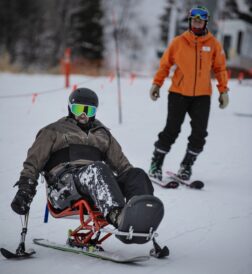Sen. Johnson’s push to ban teaching of ‘divisive concepts’ fizzles, but not dead

Photo supplied, Utah Sen. John Johnson's office
Utah Sen. John Johnson, right, at a Senate Education Committee hearing meeting on Monday, Feb. 28, 2022. A measure he proposed to prohibit teaching of "divisive concepts" was up for discussion at the meeting.SALT LAKE CITY — Discussion on Utah Sen. John Johnson‘s proposal to prohibit teaching of “divisive concepts” in Utah schools came to an abrupt end during a Senate Education Committee meeting after a fellow lawmaker moved to adjourn the gathering in the midst of the debate.
That was late Monday afternoon, and Johnson said Tuesday that Senate Bill 257 won’t make any headway as the 2022 legislative winds down before its end Friday.
Still, he plans to bring the proposal up for further discussion during an interim session this coming summer. And if nothing else, Johnson, a North Ogden Republican and chairperson of the education committee, has turned up the heat on education issues this session, drawing fire from some.
Aside from SB 257, he sponsored another measure, SB 157, meant to give parents more leeway to prevent instruction of “objectionable” material to their kids in schools. A film he helped bankroll that argued that critical race theory is embedded in Utah schools, “Identity Marxism: The Rise of Critical Race Theory,” premiered on Feb. 18.
In the course of the session, Johnson, a Utah State University professor, said he was mulling legislation taking aim at critical race theory. Last Friday, he took the step and introduced SB 257. The legislation doesn’t specifically mention critical race theory, but would ban teaching of “divisive concepts” in public schools.
Foes like Johnson see critical race theory as a curriculum taught in schools that is meant to girder notions that there are oppressor and oppressed classes of people in the nation, among other things. Others, like the American Bar Association, say such characterizations are off the mark. Rather, the ABA says, critical race theory is a means of understanding issues of race and racism and how they have evolved and become embedded in “the fabric of this nation.”
Though not mentioning critical race theory, SB 257 contains a long list of what are deemed “divisive concepts” that may not taught in classrooms. They include the notion, “that an individual, by virtue of the individual’s identity trait, is inherently privileged, racist, sexist, nationalistic or oppressive, either consciously or subconsciously.”
Johnson, by way of explanation, told the Standard-Examiner that telling a student, “that he’s responsible for slavery, that’s not fair.” Likewise, he said, telling another student he or she is a victim isn’t fair either.
“There’s no reason to start a race war. There’s no reason to have divisive political debate in our schools,” Johnson said.
Another of the many concepts that couldn’t be taught, per SB 257, is the notion “that an individual should feel discomfort, guilt, anguish or another form of psychological distress solely because of the individual’s identity trait.” Also banned from being taught is the idea “that the state or the United States is fundamentally, systemically or irredeemably racist, sexist or nationalistic.”
In introductory remarks during Monday’s Senate Education Committee meeting, Johnson said SB 257 wasn’t “squashing” history. “It’s important that we look at history. We don’t mind looking at history, warts and all,” he said.
Utah Sen. Ann Millner, an Ogden Republican and member of the education committee, led off discussion, seemingly arguing the difficulty of pinpointing “divisive” concepts. In a classroom setting, she said, one student may understand a concept put forward by an instructor one way while another student may view it another way.
“We all have different lenses that we look at things through,” she said.
Discussion didn’t progress much further, though an array of witnesses were prepared to testify on behalf of Johnson’s measure, he said. Sen. Kathleen Riebe, a Democrat from Cottonwood Heights, moved to adjourn the meeting, committee members voted 3-2 in favor of the motion and the gathering abruptly ended.
“I think that it’s very bad that people who waited here all night didn’t get to speak at all,” Johnson said in response to the vote.
SB 157, which didn’t gain any traction during the session, drew criticism from a Utah Education Association representative, Sara Jones, who described it as a measure meant to resolve a problem that doesn’t exist. Parents already have the power to prevent instruction of “objectionable” material to their kids, she said, particularly in health and sex education matters.



